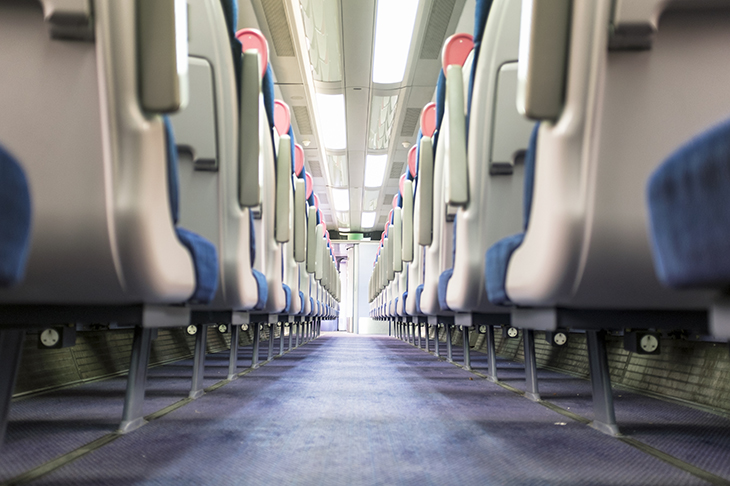Look out. Here comes a column banging on about something that, in the grand scheme of things, really doesn’t matter. But I’ve just turned 70 and surely among the compensations for old age must be the right to have a jolly good grumble from time to time. Mine, here, will be about the new hard train seats. ‘They feel like sitting on an ironing board,’ passengers are complaining.
Since the beginning of last year, and all over the country, rail operating companies have been rolling out (hallelujah! — a chance to use this ghastly expression entirely appropriately) a new kind of railway carriage. First it was Thameslink; then it was GWR; and last week I suffered in one of these carriages going all the way to Leeds. My buttocks ache at the very recollection.
In most respects these new trains are fine: light, airy, with a spacious feeling about them — in fact as you board the immediate impression is of an improved environment for passengers. Until you sit down. Ouch! Honestly, an ironing board would be more comfortable, with at least a little bit of give. These surfaces have none. Even a decent wooden chair has a shallow cupping to the seat which helps spread the body weight evenly. But with this monstrous carriage furniture the bones in your bottom bear down straight on to what feels like a square of flat MDF, upholstered in thin carpet.
Of course an increasing number of my fellow citizens these days have such enormous bums that any sense of what they’re sitting on is cushioned away by blubber and they probably wouldn’t notice even if they were sitting on rocks, but at least a few of us still have what you might call haunches. We like the soft seats on the London Underground; we’re comfortable on the sprung fabric in East Midlands Trains carriages; if we’re price conscious and travel by coach or low-cost airline we can still expect a soft seat for the journey; and on getting home we look forward to sinking into an armchair or sofa, not banging down on to a piece of hardboard.
But slowly, train set by train set, that’s what awaits even long-distance passengers. Can this assault on the nation’s bottoms really be the future of rail travel?
And there’s worse. The new (equally hard) seat backs make you sit bolt upright, and at the top they dwindle to the place where your head rests — which is so narrow that, if you began to doze, your head would be in danger of lolling right off the seat back. There are no little wings to the headrest, as in the more old-fashioned carriage in which I write this. Fortunately, sleep is likely to elude you due to the pain in your bottom and the fact that the back is so vertical that if you do pass out you’d slump forward rather than sideways.
Why this disregard for customer comfort? I tried Googling but, apart from a barrage of complaint from train passengers, I could find only some vague noises about ‘safety’ and ‘fire risks’. Other voices suggested it was all about fitting more passengers in, but I don’t buy this. A properly padded seat makes you marginally closer to the carriage roof, not to the passenger in front of or behind you. As for vertical seat backs, if these were to be inclined — and so long as they were all inclined at the same angle, remaining parallel — the adjustment wouldn’t alter the spacing of seats at all.
The other day, suffering on a Thameslink train from Brighton, I began moaning to my partner, who was for three years a special adviser in the Department for Transport. I wondered aloud how the train operating companies could have been so careless of their passengers’ needs.
My partner looked a bit shifty. Then he confessed that the decision about seats had been nothing to do with the train operating companies: it had been made by ‘some officials in the department’. These, apparently, are the people who frame the design specifications before contracts for new carriages are put out to tender.
Who, I asked? Can you identify these people? Who checked their work? My partner muttered something about not being able to pin it on particular individuals. Momentarily, I felt a rush of respect for Dominic Cummings and his diatribes against faceless bureaucratic folly.
Somewhere — somewhere in the boundless cyber-wilderness that is a Whitehall departmental archive — there will be email exchanges about these damn seats. Someone will have put up the proposal, perhaps mentioning the harder seats on many foreign trains. Fair enough — all ideas welcome — but it will be what happened next that should concern us. Did anyone in the department raise the question of comfort? Did anyone warn that passengers might not like the change? There should exist a civil servant with the wit and the authority both to register that there was a potential problem here, and to commission a small survey to test the new seats on a focus group of real passengers. These, after all, are the ultimate customers — millions of them, many commuting daily on train seats.
Did this happen? If not, why not? Whose omission was it? I want names. A small but egregious error has been made, leading to the slight but widespread discomfort of millions: an error it will now prove hard to correct. I see no reason why a request under the Freedom of Information Act could not be made.
I’ll go further. I hereby offer a prize of £200 to any reader with the time and the specialised FoI skills to extract from officialdom the relevant email exchanges, plus the name of the individual (or individuals) actually, rather than nominally, responsible. Write to me c/o The Spectator.
‘Passengers will get used to it,’ scoffed a (then) transport minister, Jo Johnson, responding last year to the complaints I rehearse here. You think so, Jo? To adapt W.S. Gilbert’s Mikado’s plans for making the punishment fit the crime …
The minister who
In railway seating
Scorns his passengers’ pains,
We only suffer
To sit on a buffer
In Parliamentary trains.
Got something to add? Join the discussion and comment below.
Get 10 issues for just $10
Subscribe to The Spectator Australia today for the next 10 magazine issues, plus full online access, for just $10.
You might disagree with half of it, but you’ll enjoy reading all of it. Try your first month for free, then just $2 a week for the remainder of your first year.















Comments
Don't miss out
Join the conversation with other Spectator Australia readers. Subscribe to leave a comment.
SUBSCRIBEAlready a subscriber? Log in